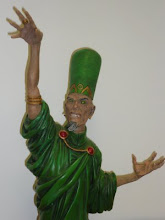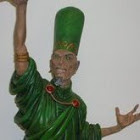A highly enjoyable and engaging Italian crime comic that nicely mixes betrayal, murder, new beginnings and grief without ever dropping out of the genre requirements. Peppino Lo Cicero is a retired mafia assassin, fishing and making shirts for his son who has taken the same job. After Peppino's son is murdered he goes looking for revenge with the assistance of two old friends. The story stylishly sidesteps the cliches of the genre and the unexpected is delivered with thoughtful force. The conclusion is happily sharp and cleverly approprite.
The astonishingly fluid and dynamic art is the first pleasure of the book. Using three colours, black, white and blue, Igort creates a detailed world where violent action has severe consequences and the cast all eagerly seize every bit of space they have on the page to makes their presence count. Instead of this descending into confusion, the balance betweeen the panels and the cast work strongly together to present the story in a vivid and intense way. The clean lines of the art, which always delivers just the right level of detail, are a pleasure to read. They have to deliver a lot of information and they do so with a subtle and understated grace.
The story, the second pleasure of the book, makes itself felt at a leisurely pace, it does not rush to action, when action comes it is brutal and weighty. The story comes up through the art to snag the reader with deeper ideas and complexity that is anticipated. Igort realises that every end is a beginning with fresh choices to be made and the choices Peppino makes as he returns to his past are unexpected and frequently moving. The old assassin has a chance to look again at his life and does so, revisiting old choices and taking a different turn this time. The cast who do not have the strength or care to make new choices find that they frequently have made a fatal error.
One of the additional pleasures of the book is that the story is so completely not American or English, the translation is transparent, the cast are clearly and fully Italian speaking expressive, credible English that never undermines their essential identity. Also the explanation for the title is smart, funny and memorable.
An outstanding comic.
The astonishingly fluid and dynamic art is the first pleasure of the book. Using three colours, black, white and blue, Igort creates a detailed world where violent action has severe consequences and the cast all eagerly seize every bit of space they have on the page to makes their presence count. Instead of this descending into confusion, the balance betweeen the panels and the cast work strongly together to present the story in a vivid and intense way. The clean lines of the art, which always delivers just the right level of detail, are a pleasure to read. They have to deliver a lot of information and they do so with a subtle and understated grace.
The story, the second pleasure of the book, makes itself felt at a leisurely pace, it does not rush to action, when action comes it is brutal and weighty. The story comes up through the art to snag the reader with deeper ideas and complexity that is anticipated. Igort realises that every end is a beginning with fresh choices to be made and the choices Peppino makes as he returns to his past are unexpected and frequently moving. The old assassin has a chance to look again at his life and does so, revisiting old choices and taking a different turn this time. The cast who do not have the strength or care to make new choices find that they frequently have made a fatal error.
One of the additional pleasures of the book is that the story is so completely not American or English, the translation is transparent, the cast are clearly and fully Italian speaking expressive, credible English that never undermines their essential identity. Also the explanation for the title is smart, funny and memorable.
An outstanding comic.







